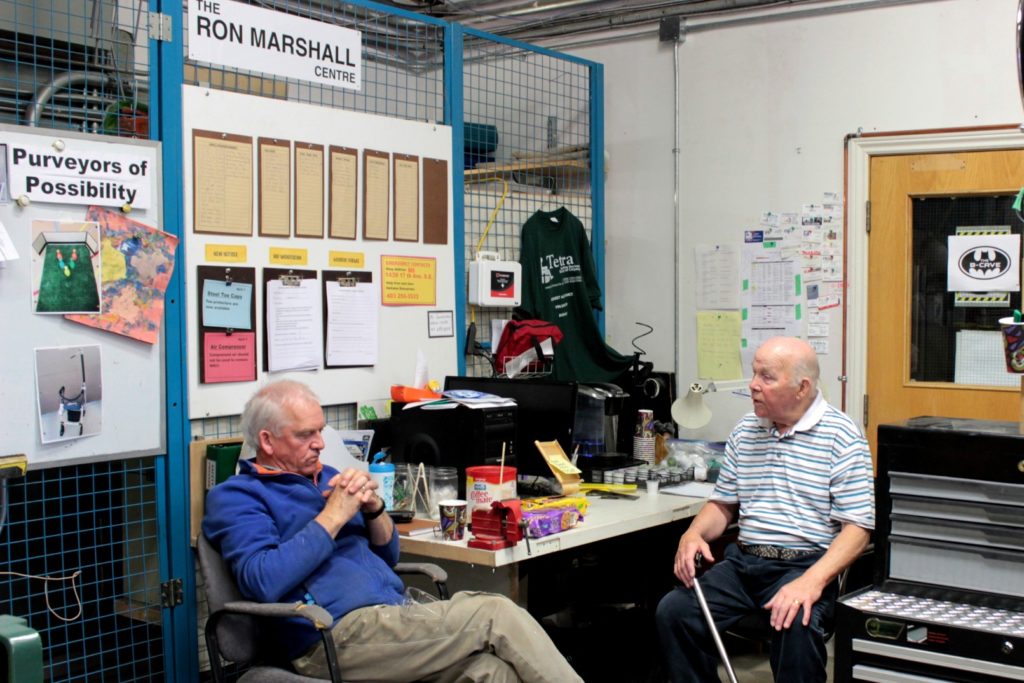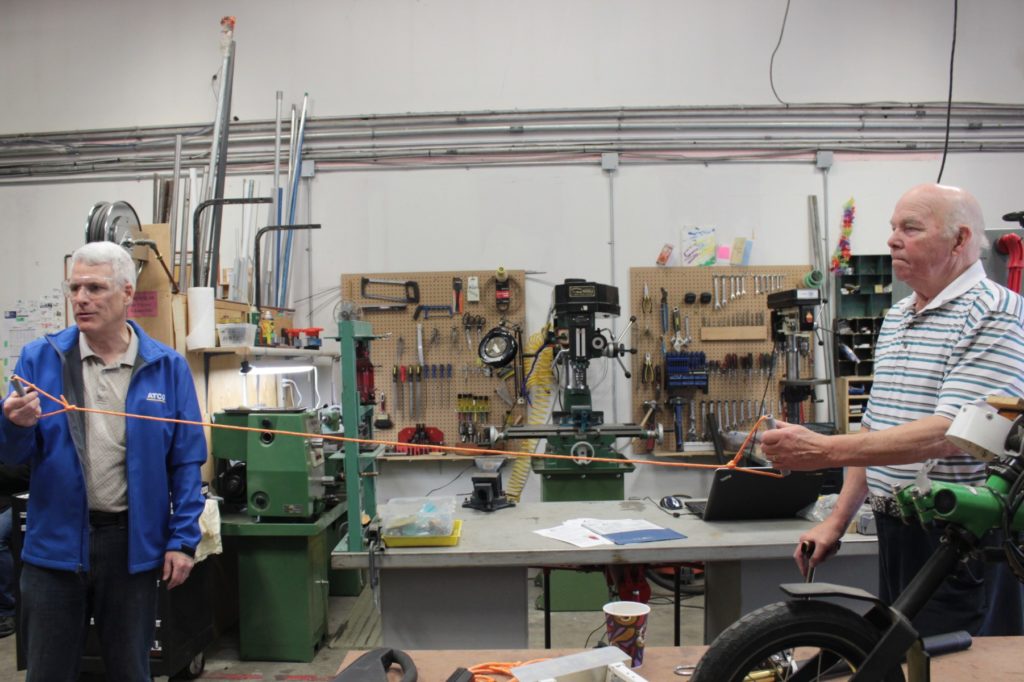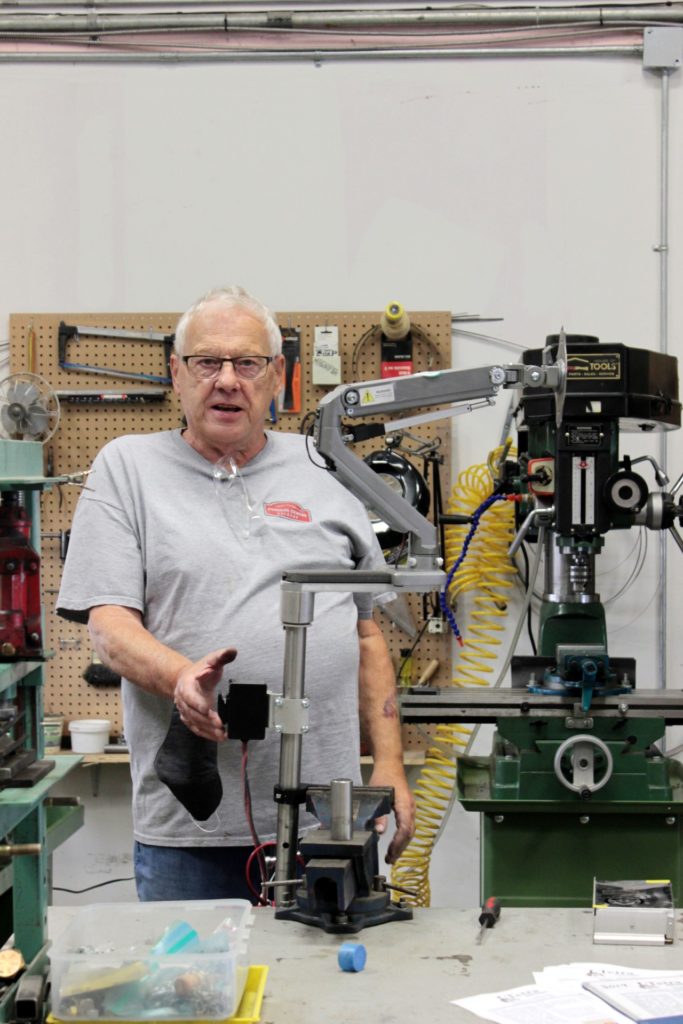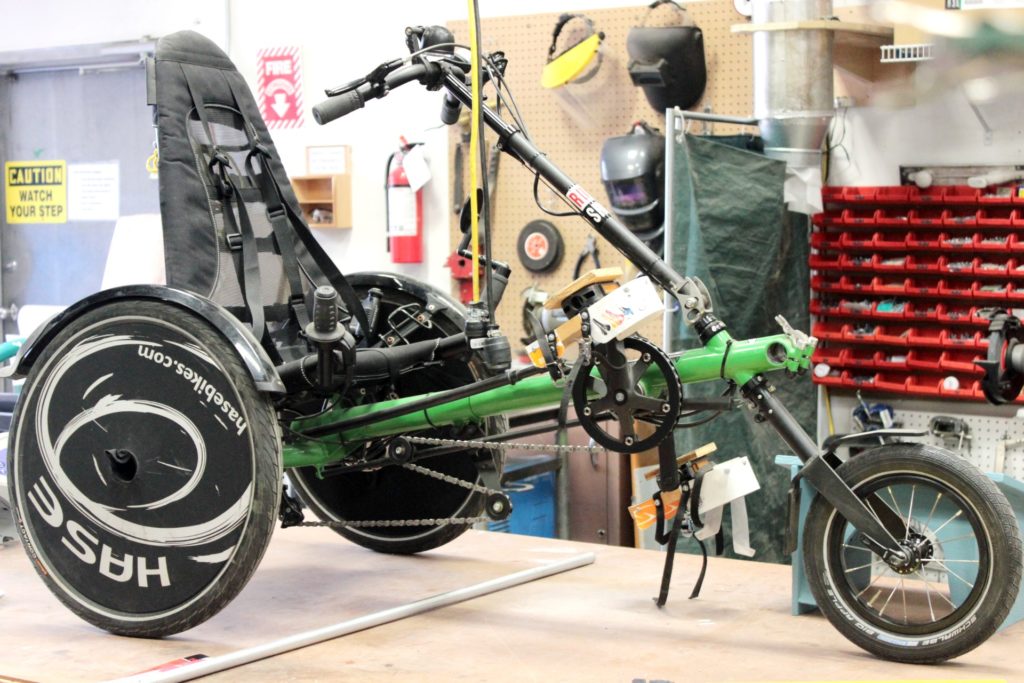The Purveyors of Possibilities

Photo by Robin Rasmussen
It’s a Saturday morning with crisp June air, just cold enough that you can see the steam coming off of paper cups of coffee, held in hands by folks sitting in hard plastic chairs on a cold concrete driveway.
They are sitting out of a small machine shop. The shop itself is filled with a menagerie of wonders. The walls are covered: pictures and tools and pieces of scrap metal and wood and electronics.
The people there are filled with excited energy. It’s palpable in the air. There’s something happening in this little machine shop that would blow the average person away. There is invention happening here.

Ideas that will start in the creative and mechanical minds of a select few. They’ll be discussed and talked over, most likely with those steaming paper cups of coffee in hand, until they percolate and thicken and coalesce. The energy is in the ideas and these ideas aim not to solve problems. Rather, they are to fulfill wishes.
This is the small machine shop of Tetra Calgary. It’s where dreams come true and wishes are granted, all through the hard work and relentless creativity of a small dedicated crew. And it’s all to help those with physical disabilities navigate a world that can sometimes seem difficult; that which might come easy to the able-bodied could be a frustrating or even dangerous obstacle to others.
This is where Tetra Calgary comes in; wish-fulfillers and purveyors of possibility.
“Nothing is impossible,” said Jim Monk, one of the resident purveyors of possibility. He is bursting at the seams with stories and a palpable pride in the efforts of this group of retired folks. They are engineers, carpenters, mechanics and machinists. They work to create customized solutions to the problems that face people with disabilities and in turn, help them overcome barriers in their day-to-day lives.
“There are things here that are amazingly simple,” he explained, as fellow Tetra member Doug Brooke shows off one of their most recent inventions. It is quite simple: a length of rope with two PVC pipes as handles.

What might seem simple at first is the solution to a complicated problem: how does one guide someone who has a visual impairment when COVID-19 requires a level of social distancing?
There’s no shop you can go and order something of the right length and comfort; no Amazon delivery will get what’s needed to their mailbox when the problem is in the here and the now. But Tetra Calgary is in the here and the now and they reach into the swirling centre of confusion and chaos and pluck out simple solutions to complex problems.

Sometimes, however, the solution is not so simple.
Fritz Peyerl of High River showed off one of the more complicated solutions: a thin, robotic and mechanical arm that can rise and fall with a press of a button. It looks like something that might be on a space station, but it’s right here in the tiny space provided by Drop-In Calgary. It would win gold stars at a science fair, but most importantly, it’s going to help aid the day-to-day machinations of an individual: a person with a wish that needs granting.
Peyerl, in fact, has won an award for his innovation and work with Tetra Calgary — and although the stories of their inventions and creations excite the mind, what stirs the heart is the stories of the people who’s lives are changed upon receiving them.
A young man, without arms or legs. Now? He often rides a custom made bicycle from Cranbrooke to Kimberly and back. His next goal? He wants to go skiing. Tetra is going to make that happen for him.
The individual who requires a ventilator and his caretaker has a hearing impairment: when the ventilator had an issue, it beeped loudly but was impossible for his caretaker to notice. Now? A visual indicator lights up on the ventilator, helping to ensure his safety at all times.

Teaching someone to throw a ball might seem like the simplest thing in the world, but what if you have no visual feedback? Tetra Calgary helped design a system of “haptic feedback” so that the blind can physically feel feedback from when they throw a ball, providing their senses with the stimulus needed to learn something that others might take for granted.
“They had no context for it before,” Monk said. “But now they can feel success.”
Although each problem is unique to an individual, every time Tetra Calgary helps someone conquer a barrier, it paves the way to make the next wish easier to grant.
“Lots of folks are going to be facing the same problem,” Monk said. “When requests come through, we coordinate and brainstorm. At any given time … there are eight to nine people with projects on the go.”
And that’s one of the most amazing parts of what Tetra does: even though the space was graciously given to them by Calgary Drop-in and a good portion of the machinery was donated by a machinist and former Tetra member named Ron Marshall — for whom the space was named — every single hour spent brainstorming, tinkering and tailoring devices and aids is free labour, provided by volunteers. They did receive a small government grant to set up the shop, but since then, they’ve operated independently alongside support from kind citizens and local businesses.
“That’s the beauty of this group,” Monk said. “It’s extraordinary for me to sit there, to sit four or five of us around the table, sharing amazing knowledge … it’s as if they come here and bubble over with inspiration and creativity.”
“I’m in the middle of inspiring inventors.”
If you’re interested in helping grant wishes or maybe have a request of your own, Tetra Calgary can be contacted tetrasociety.org. There are also other Tetra chapters across North America and Alberta, with groups located in Lethbridge, Red Deer, Edmonton and Medicine Hat.
